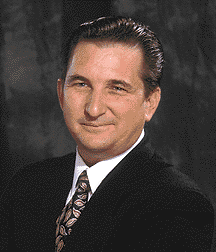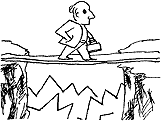The best teacher is experience, and from his experiences as a trader and a broker, Mark Douglas, consultant with his own firm, Trading Behavior Dynamics, and author of The Disciplined Trader: Developing Winning Attitudes, has experienced the gamut of trading emotions. From observing his and other people's emotional states, Douglas has developed strategies to help traders do what most professionals will tell you is the hardest part of trading -- trade using your head. STOCKS & COMMODITIES Editor Thom Hartle spoke with Douglas via telephone on October 17, 1996, about fear, self-trust, the difference between a belief system and a trading system and gaining that ever-important edge.

"Right from the beginning, I always had a sense that trading was mainly a psychological endeavor. That it had more to do with my mental perspective than anything else." -- Mark Douglas
Mark, when did you first start trading?
"I started trading futures in 1978. I was managing a commercial causality insurance agency at the time, but I was bored with it. Then one day, I got a cold call from a commodities broker. I decided to give it a try, and I started trading gold futures. From that point on, I really got caught up in the process, the same way most everyone does."
Did you start off making money?
"Absolutely! I would say that by and large, from my experience of working with traders, most everybody starts off winning."
Sort of sets the stage for what's possible.
"Definitely. Then after having I don't know how many winning trades but certainly enough to hook me, I reached a point that trading had started to become my life. So I left the causality business, came to Chicago and started work for Merrill Lynch as a retail broker upstairs at the Chicago Board of Trade (CBOT).
You were off and running! But --
"To make a long story short, within about nine months, I had lost virtually everything I owned."

The trading system just gives you an edge. In other words, you look at a particular trading system as a way to identify those patterns that exist in market behavior.
What turned you around?
"When I realized -- and I don't recall how long it took -- that I was going to be fine. Once I did, my fears just disappeared. I realized that there was more to who I was than just my possessions. I could still think, I was healthy, I still had talents. When I came to fully appreciate these assets, the fear disappeared.
We've been discussing belief systems. What's the difference between a belief system and a trading system?
"The trading system just gives you an edge. In other words, you look at a particular trading system as a way to identify those patterns that exist in market behavior. Belief systems, on the other hand, control how you perceive that pattern or market behavior, as well as how you respond to it."
And how do you define market behavior?
"The market is the collective action of everyone participating in the market at any given moment. Individuals have behavior patterns. They will do the same things under the same circumstances over and over and over again. A group of individuals will consistently display the same kind of collective behavior patterns. All a technical system does is identify those patterns and quantify them so you have a statistically reliable outcome.

